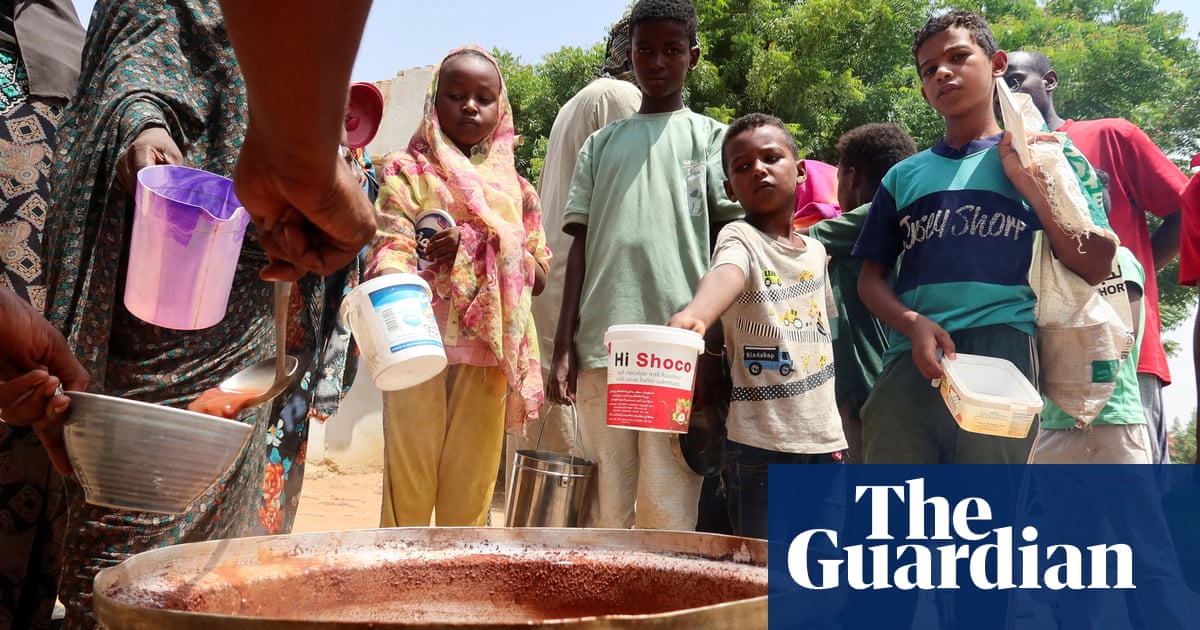Sudan is facing a famine that could become worse than any the world has seen since Ethiopia 40 years ago, US officials have warned, as aid deliveries continue to be blocked by the warring armies but arms supplies to both sides continue to flow in.
With much of the world’s attention focused on Gaza, the scene of another human-made famine, Sudan is already the worst humanitarian crisis in the world and is slipping towards a humanitarian disaster of historic proportions, with far less media coverage and global concern. A UN humanitarian appeal for the country has received only 16% of the funds it needs.
“We need the world to wake up to the catastrophe happening before our very eyes,” Linda Thomas-Greenfield, the US ambassador to the UN, told reporters.
She was speaking as El Fasher, the capital of the North Darfur region and a former humanitarian hub, faced its second month under siege by the Rapid Support Forces (RSF). The RSF is a paramilitary group that has been fighting the Sudanese Armed Forces (SAF) since April 2023, when a power struggle between two rival generals, the SAF’s Abdel Fattah al-Burhan, the country’s de facto ruler, and the RSF’s Mohamed Hamdan Dagalo, also known as Hemedti, escalated into a conflict that has split the country. The civil war has already killed 14,000 people and forced 10 million to flee their homes.
The UN security council adopted a UK-drafted resolution on Thursday, demanding an end to the El Fasher siege, but the fighting escalated on Friday with the SAF claiming to have repelled a major RSF assault, inflicting “huge losses”.
The head of the US Agency for International Development, Samantha Power, said there were concerns over what would happen to the people sheltering in El Fasher if the town fell to the RSF. That force has largely been recruited from the Janjaweed militias, who carried out massacres while fighting on the Khartoum government’s side in the Darfur genocide of 2003 to 2005.
“The RSF is on the march, and where the RSF has gone in the Darfur area historically, and in this conflict, mass atrocities have followed,” Power said,
On Friday, she announced $315m in new US humanitarian assistance for Sudan, but said hardly any aid was reaching isolated populations. Both sides have been accused of using control over food access as a weapon.
“The RSF has been systematically looting humanitarian warehouses, stealing food and livestock, destroying grain storage facilities, and wells in the most vulnerable Sudanese communities,” Power said.
The USAID chief added: “The SAF completely contradicts its commitments, and its responsibilities to the Sudanese people by having shut down cross border access from Chad at the Adré crossing, which is the main route for assistance to enter the Darfur region.”
Power said Gen Burhan could open the Adré crossing with “a stroke of the pen”. The SAF has offered another access point from Chad, the Tine crossing, but US officials say it is already obstructed and inadequate for the needs of the population and will become impassable with the coming rainy season.
“The really clear message here is that it is obstruction, not insufficient stocks of food, that is the driving force behind the historic and deadly levels of starvation in Sudan,” Power said.
She added that current data suggested the crisis is “comparable to and potentially worse” than a 2011 famine in Somalia that killed a quarter of a million people.
“I would add that the most worrying scenario would be that Sudan would become the deadliest famine since Ethiopia in the early 1980s,” she added.
after newsletter promotion
The Ethiopian famine killed a million people between 1983 and 1985, according to UN estimates. Thomas-Greenfield said that in a worst-case scenario, a famine in Sudan could become even more lethal.
“We’ve seen mortality projections estimating that in excess of 2.5 million people, about 15% of the population in Darfur and Kordofan – the hardest hit regions – could die by the end of September,” the ambassador said.
“This is the largest humanitarian crisis on the face of the planet. And yet, somehow, it threatens to get worse,” she added.
While humanitarian aid has faced constant obstruction, both sides in the war continue to receive weapons, the US officials said: the SAF from Russia and Iran among others, the RSF in particular from the United Arab Emirates (UAE), a US ally.
Thomas-Greenfield said Washington had “engaged” with the UAE on the issue. However, a White House account of a “pull aside” meeting between Joe Biden and the UAE’s sheikh Mohammed bin Zayed Al Nahyan at the G7 summit in Italy did not mention Sudan.
The US faces accusations of hypocrisy from many countries, particularly in the Global South, as Washington calls for an end to weapons supplies to parties involved in the conflict in Sudan, while continuing to provide billions of dollars-worth of weapons to Israel during its offensive on Gaza.

